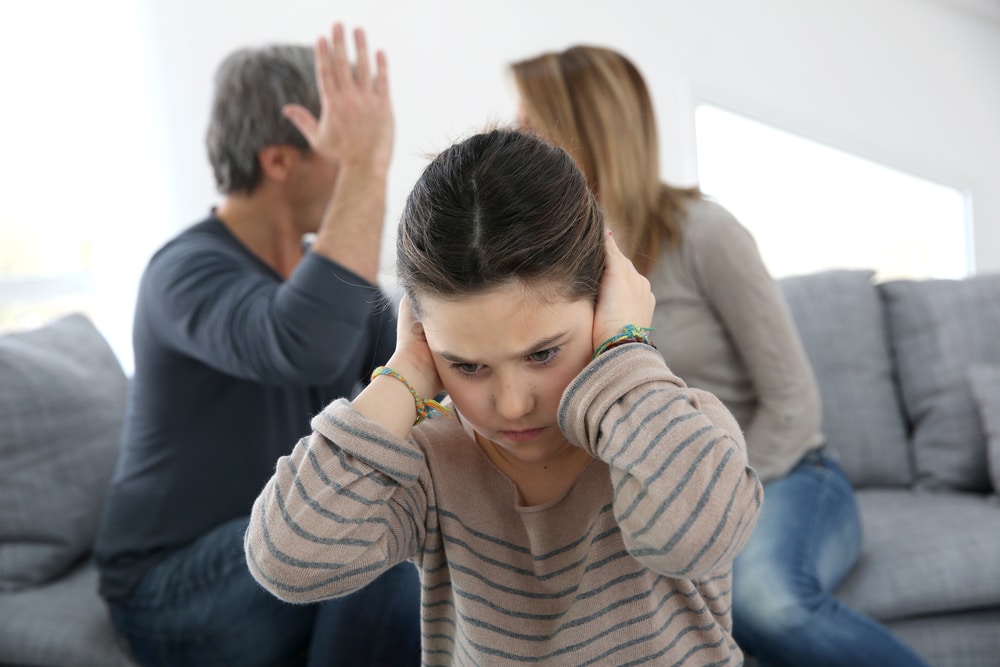
28 Sep How Children Can React During a Divorce
When it comes to divorce, every couple is different. Just the same, every family unit is different. However, there are some common reactions that children have when their parents are divorcing. Though your child may not exhibit all of these reactions due to his/her age or maturity level, the following list can help you come to understand your child’s actions or attitude while you are going through the divorce process. Some of the most common reactions by children to divorce are as follows:
1. Fear
It is not uncommon for a child to experience fear while his parents are undergoing a divorce. He may experience nightmares or even begin to regress. When a child goes through regression, he is taking a step back when it comes to maturity. For example, if your child is a toddler and has learned to walk, he may go back to crawling. Just the same, older children may begin to “baby talk,” wet the bed or become more clingy.
Your child may not be aware of these types of behavioral changes but if you do, understand that your child needs your attention. Children who experience this extreme form of fear are usually younger children who may not be able to express themselves in the way that they need to. It is important to inform a fearful child that he is loved.
2. Acting Out
Children are more likely to be irritable or defiant after finding out about the divorce. This may mean more tantrums or blatantly ignoring a parent’s rules. Older children, in particular, are more likely to act out during the stressful divorcing process.
During adolescence, children rely heavily on stability in the household. Once this stability has been challenged, they may begin to act out of anger or fear. If your child is acting out, it is important to keep a close watch on them. It is not uncommon for these emotions of fear and anger to turn into depression – especially in pre-teens and teens.
There are several things that you can do to help your child cope with your divorce. First and foremost, be honest and ask them how they feel. If you don’t ask, they may keep it bottled up. Secondly, watch for at-risk behaviors and keep an eye on their academics. These can be signs that your child is having a difficult time coping. Lastly, be sure to include your child in decisions that directly affect him.
3. Inability to Understand
The inability to understand is something that is common in younger children. This failure to understand what is going on can cause the child to think that it is his fault that his parents are fighting. Likewise, a child who does not understand may spend all of his time trying to fix whatever he believes to be wrong within the family unit.
Not understanding what is going on can be extremely difficult for children. During the divorce, a child’s schedule may be changed drastically, or he may not be getting as much attention from the divorcing couple. Children know when something is different or changing so it is best to be as honest as you can with your child.
Honesty is the best policy especially when it comes to divorce. Try to explain the situation in the simplest of terms. Let your child know that it is a conflict between both parents and the child is not the cause. Also, it is important to explain to the child that he is still loved by both parents – no matter what.
Don’t sugarcoat the situation. It is what it is – divorce. Sugarcoating the situation may further confuse your child. It is important that your child knows what to expect so that the outcome does not blindside them. Finally, it is important that you let your child know that they can talk to you or ask you about anything. Open and honest communication is extremely important. This means that you, too, need to be open to telling your child things that may affect him.
4. Attachment to One Parent or the Other
According to NaturalChild.org, children develop an emotional connection to their primary caregiver during the first six years of their life. The article goes on to state the pattern of behavior that builds this emotional bond between child and primary caregiver. These include:
* The presence of loving physical contact
* The ability to soothe a child by holding him
* The caregiver’s sensitivity to the child’s emotions and signals
* The enjoyment of each other’s company
* The caregiver’s creation of an environment where the child gains responsibility for his actions
The previous patterns of behavior create a bond that children feel strongly about. During the divorce, your child will see one parent as his primary caregiver whether you believe there to be one or not. If you are not the parent to whom your young child clings, this does not mean that your child loves the other parent more. This may not be a conscious decision but a reaction. As always, it is important to be sure that both parents continue to give the child constant love and attention.

